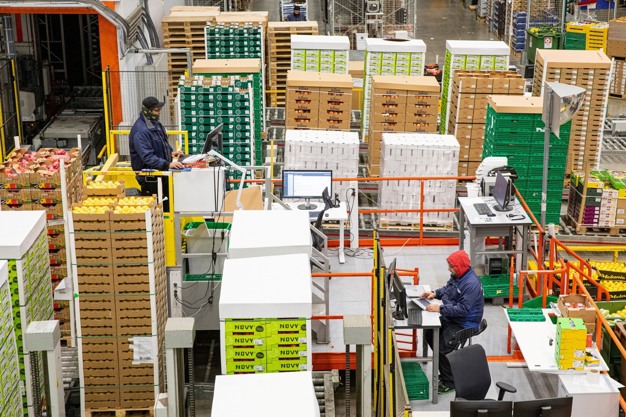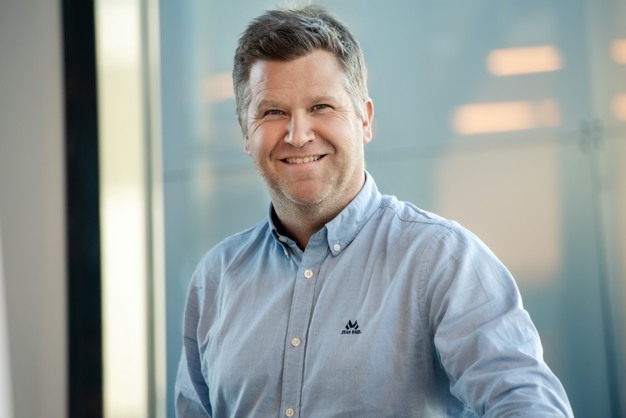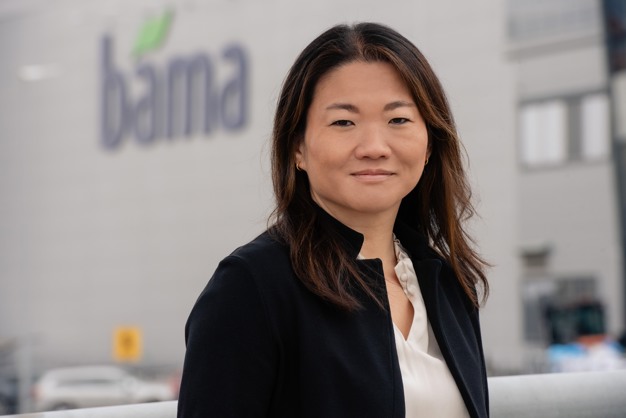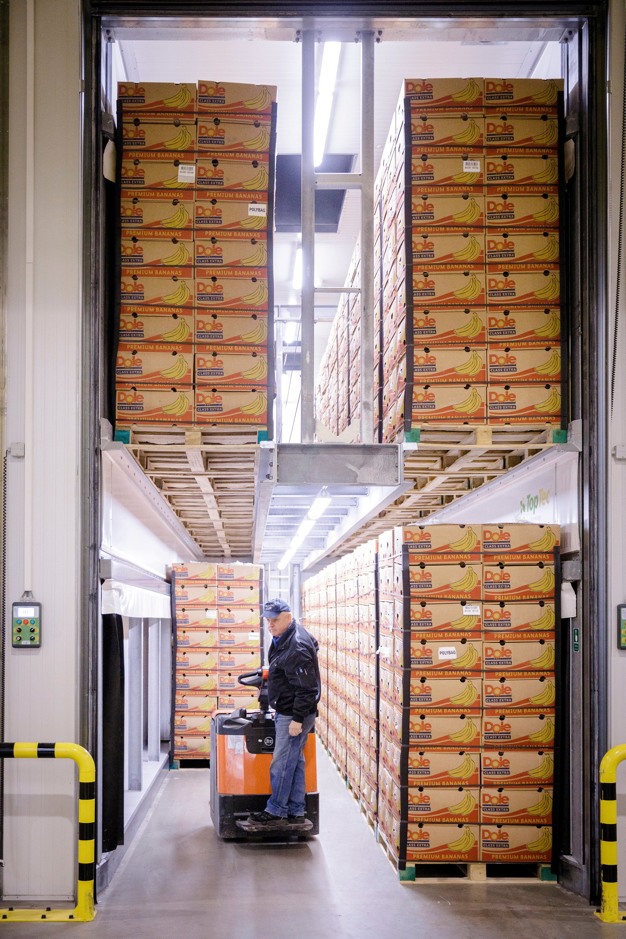Bama Gruppen AS is Norway's largest fruit, vegetable, berry and potato distributor. The company also supplies fresh cuts, flowers and plants, natural drinks and on-the-go products. With a market share of as much as 70%, it supplies two of the country's three major retailers, Retaingruppen, known under the Rema brand, and Norgesgruppen, with supermarket chains like Kiwi, Meny, and Spar in its portfolio. Visiting Bama's headquarters in Oslo, we gleaned some info about the fresh produce market in the westernmost Scandinavian country.
Bama headquarters in Oslo
The company started as a lumberyard in the late 19th century, but in 1905, founder Christian Matthiessen was one of the first in Europe to begin importing bananas. Hence the company's name: a combination of that first import product and its founder's last name. Banana importing remained the core business until the 1960s when the fruit and vegetable range gradually expanded. Today, the company, with a turnover of some €1.9 billion, has distribution centers, packing stations, and processing plants all over Norway. It supplies about 500,000 tons of fresh produce annually to retailers and hospitality and food service companies. It employs 3,100 people, with 810 working in overseas branches, mostly in other Nordic countries. BAMA also owns 99% of Nature's Pride, the exotics specialist in the Netherlands.
Same price throughout the country
The company even supplies supermarkets in the sparsely populated north of Norway, home to less than 500,000 people. "Store prices there are the same as in the southern part and Oslo, despite the higher transport costs," begins Petter Henrik Gathen, purchasing manager at Bama. "The costs are shared, so people in the north don't have to spend more to survive. That's part government policy - the government wants Norwegians to be able to live anywhere in the country and does things like providing subsidies for housing in the far north or sparsely populated areas - but private companies follow this philosophy, too, and reduce costs. Per capita consumption of certain products is quite high, and we have a large market share, so we're well positioned to tow that line."
 Distribution center Oslo
Distribution center Oslo
Traditional Norwegians
Sales to the retail sector, which makes up most of this distributor's revenue, skyrocketed during the pandemic. It has, however, dropped to usual levels and remains stable. According to Tobias Nord, Bama's Business Development Manager, the company has not lost any market share to, for example, meal box deliverers.
"Also, retailers offer convenience products, and there are still plenty of corner stores in our country, which are formidable competition for such delivery services. Last year, shoppers visited stores an average of 4.2 times per week. That's incredibly high. Norwegians are still very traditional about that, just as they're very attached to familiar brands," Tobias says.
 Purchase manager Petter Henrik Gathen
Purchase manager Petter Henrik Gathen
Locally grown is popular but limited
Bama supplies its customers with Norwegian-grown fruit and vegetables where possible. These are either seasonal or long-stored products, like potatoes and carrots. Of the fresh produce it supplies, 37% is locally grown. "Consumers prefer local fruits and vegetables, and during the Norwegian season, the Norwegian share is as high as 90 percent. Despite the cold climate, we aim to increase the share of Norwegian products to 50 percent year-round in the coming years. However, the most important goal is to boost overall consumption," says Pia Gulbrandsen, CCO at Bama.
Compared to cultivation in Belgium - with a population double the size of Norway and somewhat more cultivation options - it is clear that Norway's fresh produce harvest is quite limited. For instance, according to Faostat data, Norway's 2022 potato crop clocked in at 376,400 tons compared to 3,577,730 tons in Belgium (10% of the Belgian crop). Norway harvested 23,127 tons of onions (14% vs. Belgium), 10,780 tons of cauliflower and broccoli (8%), 13,562 tons of tomatoes (5%), 17,077 tons of apples (7%), and 7,052 tons of strawberries (14%). Proportionally, though, Norway harvested more raspberries (1,903 tons versus 2,040 tons in Belgium), redcurrants (534 tons versus 790 tons), and cucumbers (21,709 tons versus 34,920 tons).

Chief Communications Officer Pia Gulbrandsen
Increasing consumption
A side note, of course, is that Belgium specializes in growing many of these products with the goal of being a net exporter. "In certain products, we're almost self-sufficient or will be soon," says Petter Henrik. "And if we can get people to eat more fruits and vegetables, local product consumption will automatically increase." Because there, too, considering figures released by World Population Review based on Foastat statistics, Norway has some catching up to do. In 2020, Norwegians ate 74.3 kilos of fruit per capita for the year, while Belgians consumed 93.2 kg. For vegetables, it is 157.3 kilos and 230.6 kg, respectively.
It is not just the weather that hampers the cultivation of certain fruits and vegetables; the cost structure is considerable. "It's not feasible to grow blueberries; it's very labor-intensive. And with the high wages in Norway, growers could never compete with imports from countries like the Netherlands or Poland. By raising import duties, the government is trying to protect some crops, such as potatoes and lettuce, but even with that, blueberry growers still wouldn't be profitable," Tobias explains.
Ports of Oslo and Rotterdam
Norway, thus, imports a lot of fruit and vegetables. It does so from other European countries - citrus and greenhouse vegetables from Spain, apples from Poland, lettuce from Italy, etc. -but also from Africa and South America. "To reduce logistics costs and deliver the products to customers as fresh as can be, we prefer getting containers at the Port of Oslo, if possible. Some shipments reach us via Rotterdam, especially the part-loads and fruit ripened in the Netherlands first. That happens with, for example, our ready-to-eat avocados from Nature's Pride. That company also manages other exotic products for us, like mangoes, chilies, and pulses," Pia points out.

Israel, Egypt, and Morocco
Israel has long been an important region for Bama for, say, off-season potatoes. "Bama complies with legal requirements and the current recommendations from authorities regarding trade with goods from Israel. After a comprehensive assessment, we have chosen not to plan for the sale of products from Israel in the upcoming season. In our evaluation, we have placed particular emphasis on the responsibility to exercise caution due to the ongoing war, as well as challenges related to travel advisories that make it difficult for us to visit suppliers," Pia says.
Israeli products are unloaded in the port of Koper in Slovenia and brought to Norway by truck. This logistical move also applies to imports from Egypt. "We buy open-field seedless grapes, citrus, and even lettuce from there. There's more and more investment in greenhouses, though. We'll visit that country in December to check things out. Egypt is booming, but Morocco is another origin we've had our eye on recently, especially for tomatoes. We're always looking for new growing countries," says Tobias.
The company imports either by buying directly from growers or via brokers. "In Spain, we need middlemen who can bundle the supply for us. Still, we try to control all aspects of the chain as much as possible. To do that, a team of about ten people travel the world and visit growers and packing facilities," adds Petter Henrik.
Little organic, lots of plastic
Eating organic is not taking off in Norway. In 2016, the share was 3%, which has actually since dropped to 1.6% and is largely limited to carrots, apples, lemons, and limes, he says. Its growth margin is mainly in the convenience category. "There's still considerable progress to be made in the pre-cut and convenience segment. I suspect pre-cut fruit will become an even more important category than ready-to-eat fruit, a concept Shawn Harris of Nature's Pride created in 2005 at Bama's request," Petter Henrik says.
Convenience products are obviously packaged, but Norwegian supermarkets often sell their fresh fruit in plastic, too. "The debate about the most environmentally friendly packaging is still raging. Plastic is actually the best option in some cases. Take cucumbers. Research shows that without the film, much more of it would be wasted. Hygiene is also a strong pro-packaging argument. We're following the EU discussion around this very closely, and we try to influence the Norwegian regulations where we see it is important for the shelf life of the products. Just like every link in the value chain, we're always looking for the best solution," Pia concludes.
For more information:
Pia Gulbrandsen (CCO) Bama Gruppen AS
Bama Gruppen AS
40 Nedre Kalbakkvei
1081, Oslo, Norway
Tel: +47 22 88 05 00
[email protected]
www.bama.no
